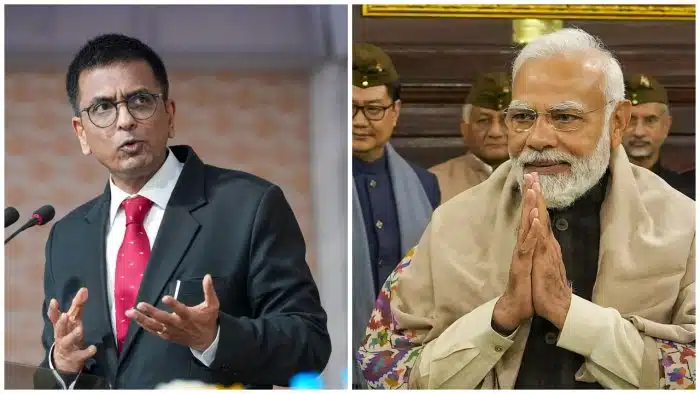“Agar Dabaav Hota To Kya Yeh Nirnay Aa Jaata”?The CJI stated that the courts are constantly ensuring that the government is held accountable, and he did not want to engage in a dispute with the Law Minister. He also mentioned that he respects the Law Minister’s perspective.

The CJI, DY Chandrachud, participated as a speaker at the India Today Conclave on Saturday, March 19. The topic of discussion was ‘Justice in the Balance: My Idea of India and the Importance of Separation of Powers in a Democracy.’ CJI agreed to take live questions in the conclave and expressed his view openly on several matters.
CJI speaking on the same stage where Law minister Kiren Rijuju spoke about the constitutional principle of the “Lakshman Rekha,” which he sees as a boundary that should not be crossed. Law minister expressed concern that if the judiciary oversteps into the space of administration, it will interfere with the functioning of the executive branch of government. Rijuju emphasized the need for a clear separation of powers between the branches of government, suggesting that if the judiciary engages in administration, it may neglect its primary role in the justice system.

Backlog of Unresolved Cases
The first question directed to the Chief Justice of India at the India Today Conclave focused on the issue of pending cases. In response, the Chief Justice acknowledged the shortcomings of the Indian judiciary system and highlighted the need for greater efficiency. He explained that the skewed judge-to-population ratio and inadequate infrastructure in the district judiciary are some of the main reasons for the current situation.
Emphasizes technology’s role in transforming the judiciary
The CJI also spoke about the crucial role technology can play in enhancing access to justice and transforming the judicial process. He highlighted his mission to modernize the judiciary through the use of technology and the need to look beyond COVID-era initiatives such as virtual court facilities. The Chief Justice emphasized the importance of making court proceedings and legal documents accessible to all citizens and highlighted the digitization of all 34,000 Supreme Court judgments as a step in that direction. He also mentioned the use of artificial intelligence and machine learning to translate these judgments into various languages, making justice more accessible to people who may not speak English. He also added that vision is to make justice an essential service that is accessible to all citizens, regardless of their location or socio-economic background.

Pressure On Judges
When asked if he faced any pressure to make a certain decision in a case, the CJI responded that in his 23 years as a judge, no one had ever instructed him to solve a matter in a particular manner. He mentioned that they were very clear in following the principles, and he would not discuss any ongoing case with his colleagues. He also shared that even though they share lunch with their colleagues, they do not share anything about the appeal as they are trained not to do so.
He said if by pressure, you meant pressure from executive then there is no pressure from the executive or political arm of the government in deciding cases. However, there may be pressure on the conscience, mind, and intellect to search for the correct solution in cases that don’t have a clear solution. He believes that this is not pressure, but rather a search for the truth. He referred SC decision to set up a committee comprising himself to appoint the Chief Election Commissioner. And asked whether the decision would have been made if there had been any pressure.
He also said that sometimes it becomes difficult to separates policy & politics from the law but we have to do that thing regardless of its difficulty.












